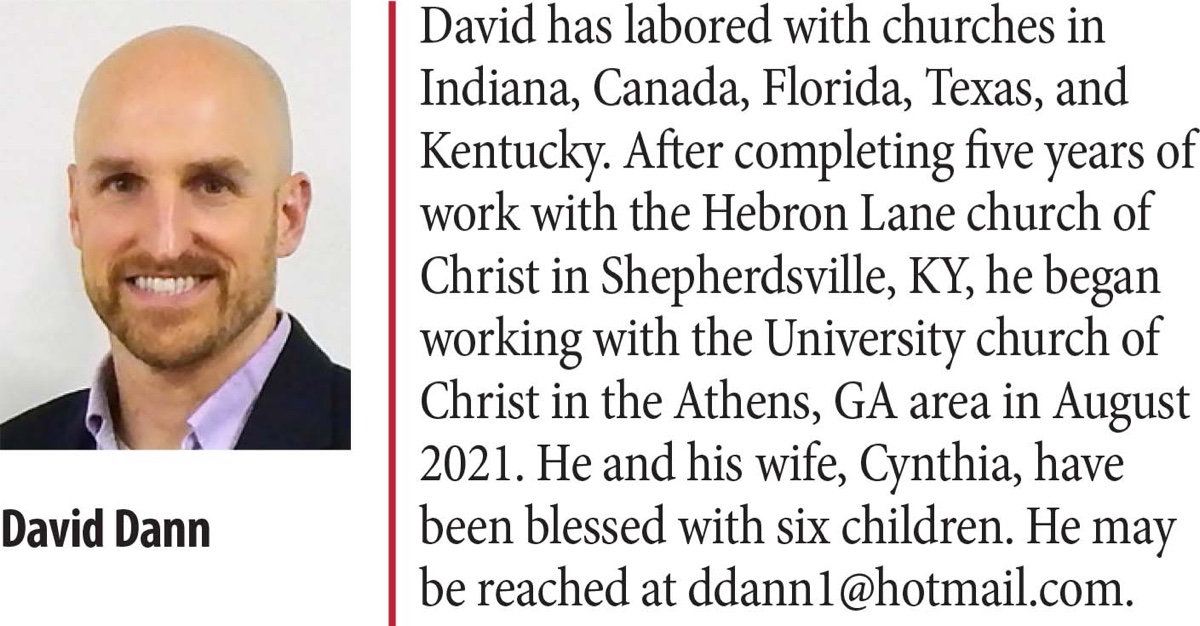
by David Dann
Synopsis: True worship affords the children of God the blessed privilege of jointly participating with Him and His people in spiritual things.
John the apostle explained his reason for writing his first inspired letter to Christians as follows: “that which we have seen and heard we declare to you, that you also may have fellowship with us; and truly our fellowship is with the Father and with His Son Jesus Christ” (1 John 1:3, NKJV). John’s words emphasize both the vertical and horizontal aspects of fellowship—the child of God has fellowship with the God of heaven while at the same time having fellowship with his brothers and sisters in Christ. The term so often translated “fellowship” or “communion” (koinonia) in the New Testament is defined as “fellowship, association, community, communion, joint participation” (Thayer’s Greek-English Lexicon, 352). According to W.E. Vine, fellowship is “sharing in common” (Vine, s.v. “Fellowship”). In the context of the church in the New Testament, fellowship always involves sharing in spiritual activity. God’s people share with Him in this special spiritual bond while at the same time sharing in spiritual things with fellow believers. One key area in which this spiritual sharing is evident is in worship. Please consider what the Bible says about worship and fellowship.
Vine summarizes his comments on the terms translated “worship” in the New Testament as follows: “it is not confined to praise; broadly it may be regarded as the direct acknowledgement to God, of His nature, attributes, ways and claims, whether by the outgoing of the heart in praise and thanksgiving or by deeds done in such acknowledgment” (Vine, s.v. “Worship”). Worship of the God of heaven is characterized by expressions of reverence which are both prescribed by, and directed toward, Him. The Bible describes worship as a specific action in which one engages at a specific time and place (cf. Gen. 22:5; 2 Sam. 12:20; Acts 8:27-28; 24:11). Rather than all of life constituting “worship,” one worships God when he determines to engage in a specific spiritual act of reverence which is directed toward Him.
According to the New Testament, Christians are authorized to worship God through prayer (Acts 2:42), singing (Col. 3:16), teaching the doctrine of Christ (Acts 11:26), and by giving of their means (1 Cor. 16:1-2) and partaking of the Lord’s Supper (Acts 20:7; 1 Cor. 11:23-26) when assembled with the church on the first day of the week. God is properly worshiped by those who offer their reverent expressions of praise, thanksgiving, and devotion to Him in harmony with what He has prescribed for worship in His word.
Sinners enter into fellowship with God through the sacrifice of His Son when they believe and obey the gospel of Christ (Gal. 3:26-27). Those who believe and practice the truth maintain fellowship with God (1 John 1:6-7). The apostle Peter reaffirms the words of the psalmist as follows: “For the eyes of the Lord are on the righteous, and His ears are open to their prayers; but the face of the Lord is against those who do evil” (1 Pet. 3:12). While God receives and accepts the worship of those who maintain fellowship with Him by obeying His instruction, He rejects the worship of those who are not in fellowship with Him. Jesus made this plain in His rebuke of the scribes and Pharisees, saying, “Hypocrites! Well did Isaiah prophesy about you, saying: ‘These people draw near to Me with their mouth, and honor Me with their lips, but their heart is far from Me. And in vain they worship Me, teaching as doctrines the commandments of men’” (Matt. 15:7-9). Worship is offered in vain by those who worship while entangled in sin and error. God will not accept worship that is offered by those who are not in fellowship with Him.
Worship involves sharing in spiritual activity. On Pentecost, about three thousand people entered into fellowship with God by meeting the terms of salvation through His Son (Acts 2:41). Following this, the Bible says, “They continued steadfastly in the apostles’ doctrine and fellowship (koinonia), in the breaking of bread, and in prayers” (v. 42). The first followers of Christ shared together in spiritual activity in collective worship of God.
The Lord’s Supper involves fellowship. Paul writes, “The cup of blessing which we bless, is it not the communion (koinonia) of the blood of Christ? The bread which we break, is it not the communion (koinonia) of the body of Christ? (1 Cor. 10:16). The Lord promised His disciples, saying,”But I say to you, I will not drink of this fruit of the vine from now on until that day when I drink it new with you in My Father’s kingdom” (Matt. 26:29). In partaking of the unleavened bread and fruit of the vine in remembrance of the sacrifice of Christ, each worshiper shares in spiritual activity with the Lord Himself.
Giving involves fellowship. Paul refers to the collection taken by local churches and used to relieve needy saints as “the gift and the fellowship (koinonia) of the ministering to the saints” (2 Cor. 8:4), as “liberal sharing (koinonia) with them” (9:13), and as “a certain contribution (koinonia) for the poor among the saints” (Rom. 15:26). Members of the church jointly participate in the spiritual work of relieving needy saints by giving on the first day of the week (cf. 1 Cor. 16:1-4). In addition to this, Paul referred to the financial support he had received from the church in Philippi, saying, “I thank my God upon every remembrance of you, always in every prayer of mine making request for you all with joy, for your fellowship (koinonia) in the gospel from the first day until now” (Phil. 1:3-5). In taking up a collection on the first day of the week, each worshiper is sharing in spiritual activity in relieving needy saints and contributing to the support of those who preach the gospel.
Teaching involves fellowship. Constant teaching and preaching represent a key aspect of the spiritual activity in which worshipers engage each week (cf. Acts 11:26; 20:7). Paul instructed the churches of Galatia, saying, “Let him who is taught the word share (koinonia) in all good things with him who teaches” (Gal. 6:6). In participating in the proclamation of God’s word, both the teacher and the hearers share in spiritual activity involving evangelism and edification.
Singing involves fellowship. Paul instructed the church in Colosse, saying, “Let the word of Christ dwell in you richly in all wisdom, teaching and admonishing one another in psalms and hymns and spiritual songs, singing with grace in your hearts to the Lord” (Col. 3:16). As they sing in worship, God’s people jointly participate in a pursuit that is done “to the Lord” while at the same time having been designed to serve the purpose of “teaching and admonishing one another.” By engaging in song worship, the members of the church share in a spiritual activity that honors God and edifies each participant.
Prayer involves fellowship. In his first letter to the church in Corinth, Paul describes joint participation in the prayers offered in the assembly in which one brother leads and the others are able to “say ‘Amen’ at your giving of thanks” (1 Cor. 14:16). In joining together in prayer to God, members of the church share in spiritual activity by bringing their expressions of praise, thanksgiving, and supplication before His throne.
What a great privilege it is to be able to participate with the Lord and with fellow believers in offering to God that which He has prescribed in His word. The fellowship with God and fellow believers that is experienced by those who worship Him in spirit and in truth is truly one of the greatest spiritual blessings found in Christ.] 
Thayer, Joseph H. Thayer’s Greek-English Lexicon of the New Testament. Peabody, MA: Hendrickson, 1999.
Vine, W.E. “Fellowship: Vine’s Expository Dictionary of NT Words.” StudyLight.org. https://www.studylight.org/dictionaries/eng/ved/f/fellowship.html.
———. “Worship or Worshiping: Vine’s Expository Dictionary of NT Words.” StudyLight.org. https://www.studylight.org/dictionaries/eng/ved/w/worship-worshiping.html.


